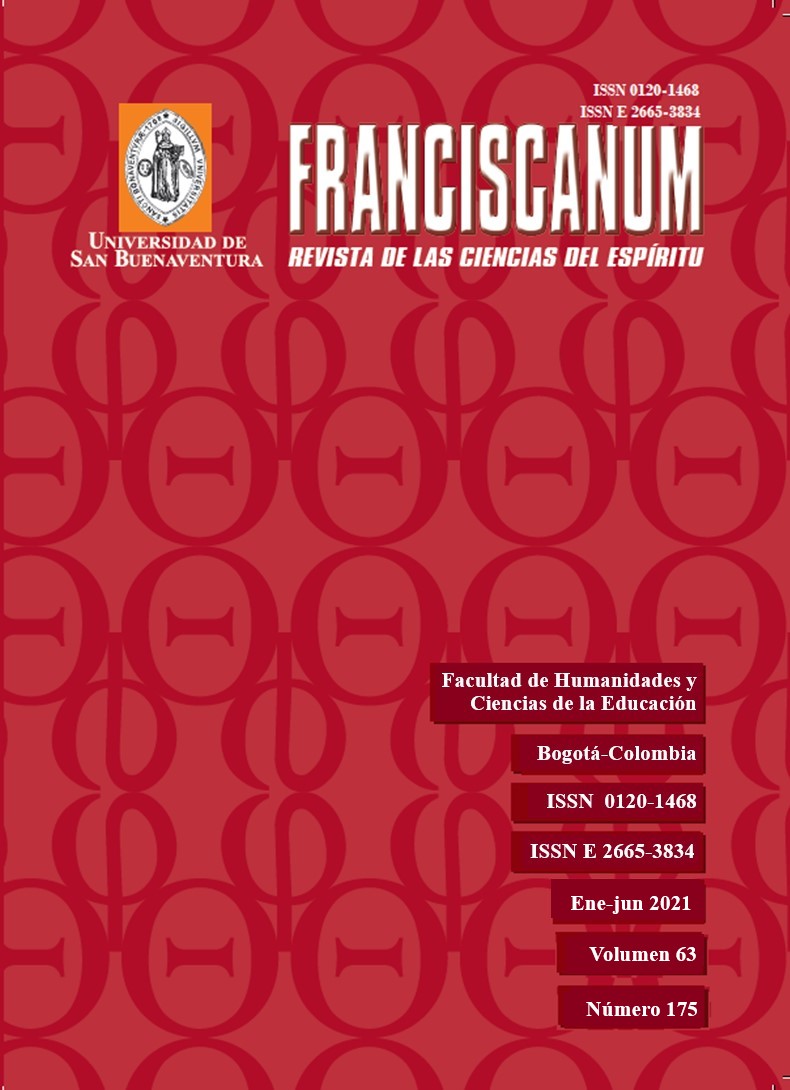This journal provides immediate open access to its content, based on the principle that giving the public free access to research helps a greater global exchange of knowledge.
Therefore, the Creative Commons 4.0 Attribution Attribution - Equal Share (by-sa) License is accepted: The commercial use of the work and the possible derived works is permitted, the distribution of which must be done with a license equal to that regulates the original work.
http://creativecommons.org/licenses/by-sa/4.0/
Along these same lines and in line with the Open Access policy, it is clarified that the authors maintain their rights to articles, without restrictions and, in the same way, they maintain their publication rights, without restrictions. They are only asked to reference the number of the Franciscanum magazine where the article initially appeared.
Abstract
The development of the personal being in Edith Stein. From the nucleus to the formation of the person
Abstract
This paper analyses Stein's conception of personal development that happens from a nucleus, a personal center. Stein already identifies this nucleus in phenomenological writings, as a personal structure, synonymous of his own individuality, constituted by soul self. The concept of the nucleus will be developed at a later stage of his thinking in which she elaborates an ontology in an anthropological key. The nucleus informs the soul and the body during the process. Unlike Tomas de Aquino, individuality isn’t given by the body (matter); but by the form, from within. Development comprises the whole of the person, both interiority and exteriority. However, it will be in the personal and unique relationship of the human being with the divine being, that the nucleus, understood as the ‘essence of the soul’, will open fully and will get to know that specific image or ‘qualitative mark’ that is yours. The full unfolding of the nucleus would be in the capacity to love God and to love our neighbour.
Key words: personal development, nucleus, individuality, person, sou
References
Aquino, Tomás de. Questionis disputatae, de potentia. Traduzione italiana di A. Campodonico. La potenza di Dio. Firenza: Nardini Editore, 1991.
Aquino, Tomás de. De ente et essentia. (edição billingue). Trad. Catherine Capelle. L’être et l’essence. Paris: Vrin, 1971.
Agostinho. S. Obras de San Agustin, en edicion bilingue. Tomo V- Tratado sobre la Santíssima Trindade. Madrid: Biblioteca de Autores Cristianos, 1948.
Betschart, Christof. «Despliegue y desarrollo de la individualidad personal según Edith Stein». Steiniana 1, Vol. I (2017): 97-125. Consultada em novembro 30, 2018. DOI: http://dx.doi.org/10.7764/Steiniana.1.2017.6
Betschart, Christof. «L’interprétation structurelle et relationnelle de l’imago Dei - proposition d’articulation à partir d’Edith Stein et sa conception de l’individualité de la personne humaine». Revue des Sciences Philosophiques et Théologiques 101 (2017): 287-319.
Betschart, Christof. «L’accomplissement de la personne humaine selon Edith Stein». Vives Flames 275 (2009): 13-21. Consultada em setembro 6, 2018. https://doc.rero.ch/record/32365/files/Betschart_L_accomplissement_de_la_personne_humaine_VF_2009.pdf
Bouillot, Bénédicte. Le noyau de l’âme selon Edith Stein: De l’épochè phénoménologique à la nuit obscure. Paris: Hérmon éditeurs, 2015.
Caballero Bono, José Luis. «Ejes transversales de pensaient de Edith Stein». Teología y Vida 1-2, Vol. 51 (2010): 39-58. DOI: 10.4067/S0049-34492010000100003
Husserl, Edmund. Ideen zu einer Reinen Phänomennologie und Phänomenologischen Philosophie, Zweites buch Husserliana, volume IV, Den Haag: Martinus Nijhoff, 1952.
Errico, Rosa. «La materia signata quantitate: Tommaso d’Aquino a confronto». Aquinas II, Anno L (2007): 763-795.
Henry, Michel. L'essence de la manifestation. Paris: PUF, 1963.
Levinas, Emmanuel. Totalité et Infini. Essais sur l’extériorité. La Haye: Martinus Nijhoff, 1984.
Scheler, Max. Formalisme en éthique et éthique matérielle des valeurs. Trad. Maurice Gondiallac. Paris: Gallimard,1955.
Scheler, Max. Nature et formes de la sympathie. Paris: Payot &Rivages, 2003.
Stein, Edith. Zum Problem der Einfünhlung. ESGA 5. Verlag: Herder, 2008.
Stein, Edith. Einführung in die Philosophie. ESGA 8. Freiburg-Basel Wien: Herder, 2004.
Stein, Edith. «Endliches und ewiges Sein. Versuch eines Aufstiegs zum Sinn des Seins, (1935)». In Edith Steins Werke. Band II. Freiburg: Herder, 1950.
Stein, Edith. «Potenz und Akt. Studien zu einer Philosophie des Seins». In Edith Steins Werke. Band XVIII. Freiburg-Basel-Wien: Herder, 1998.
Stein, Edith. «Der Aufbau der menschlichen Person». In Edith Steins Werke. Band XVI. Freiburg-Basel-Wien: Herder, 1994.
Stein, Edith. «Briefe an Roman Ingarden». In Edith Steins Werke. Band XIV. Freiburg-Basel-Wien: Herder, 1991.
Stein, Edith. «Welt und Person. Beiträg zum christlichen Wahrheitsstreben». In Edith Steins Werke. Band VI. Louvain-Freiburg: Herder, 1962.
Schulz, Peter. «Persona y génesis. Una teoría de la identidad personal». Anuario Filosófico 31 (1998): 785-817.
Tommasi, Francesco Valerio. L’analogia della persona in Edith Stein. Roma/Pisa: Fabrizio Serra Editore, 2012.
Tommasi, Francesco Valerio. «Erich Przywara et Edith Stein: de l’analogie de l’être à une analogie de la personne». Revue des Sciences Philosophiques et Théologiques 99 (2015): 267-279.



















